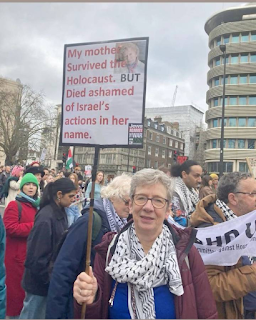Witnessing Whiteness: The Need to Talk About Race and How to Do It - Review of an Excellent Book!
It was a crowd of primarily Black
spectators that first brought my racial being to consciousness. I will never forget the pointing, laughter,
and yells: “Look at the white girl!” As
a sophomore in high school in the mid-1980s, I was the different one for the
first time, the minority within a group.
Eight Black girls and I competed to go to the California State track
meet in the 400-meter race. (xi)
So begins the Introduction of a most interesting book,
Shelly Tochluk’s: Witnessing Whiteness: The Need to Talk About Race and How
to Do It. (Edition three is
scheduled to come out in August, 2022, two months from now.)
Tochluk is very direct, often with personal examples
of the importance of white people focusing upon their own complicity in racism,
and their need to proactively learn and become as active as possible at
dismantling structural racism. She talks
clearly of how we live in multicultural settings, yet understand so little of
the daily experiences of BIPOC. The
author further makes very clear how we resist thinking and talking about race,
except in limited distant ways.
When we say that we do
not see another person’s color, what we essentially are saying is that we do
not see a person’s racial placement as meaningful. Basically, we are saying that we do not see
the ways that a person of color experiences the world differently than does a
white-appearing person. (p.27)
Since that time, I have
learned that at the same time that I experienced a lack of attendance, there
were teachers of color at the same school who did not
experience the same issues I did. These
teachers of color went to the homes.
They overcame their own fears and anxieties. They created parent-teacher events. The parents came. They reached out respectfully before trouble
emerged. Their students achieved more
than mine. (p,43)
(regarding being a white
Abolitionist) Unfortunately, becoming aware of, and
resisting, skin privilege is an incomplete strategy. Practically, resisting the benefits of skin privilege
does nothing to stop others from perceiving us and treating us preferentially
in ways we cannot control. We also can
only resist something that we consciously recognize. This model can allow powerful unconscious
elements to slip by undetected and remain unworked. (p.46-7)
Witnessing involves creating
sufficient insight to imagine and support becoming active in racial justice
efforts both within and outside of our school, work, and social settings. Witnessing means knowing that we remain
unhealthy as long as we are unconscious perpetrators and bystanders to racial
injustice. Ultimately, witnessing
requires us to know that our society remains unhealthy as long as we do not
recognize our privilege and do not give voice to the ways that racial injustice
continues to create dis-ease and distress in all of us. (p.49-50)
Choosing to stay within a
heated, conflict-filled dialogue regarding race that at times might appear to
be overly harsh or incorrectly managed is something that white people generally
avoid. Our sense of ourselves as
individuals, not marked by race, preempts our ability to really listen to someone
who challenges us regarding issues of subtle racism, especially our own. (p.167)
Doors swung open for me. Beyond my parents, there were many individuals
who helped me get to where I now stand.
My coaches, teachers, mentors, and friends at various times, and in
various ways, helped ensure that hard work did not go without reward. At times, benefits came from those who mentioned
that I reminded them of themselves in their younger days. Other times, benefits
came from open doors bred from social connections to which many would not have
had access.
Further, benefits came
from the fact that my entire racial/ socioeconomic/ cultural background was
similar to many of the decision makers in my life, such that I could easily inspire
ease and a sense of camaraderie in an interview setting. (p.207)
First, we do a better job
witnessing if we accept responsibility for triggering emotional upset. Exactly what pulled the trigger is not as important
as how we respond. … In essence, we
should take up our responsibility, the ability to respond, by
sitting in the fires we set for ourselves without either (1) judging the person
reacting as “overly emotional,” which white people tend to do, or (2) expecting
to be rescued from the fiery heat. (p.228-9)
(referring to white –
support group space in her case with AWARE-LA) We work to heal ourselves. We admit our
resistances, question our actions, support each other’s growth, and challenge
each other to desegregate our lives. (p.235)
I have given a limited
sampling of some of Shelly Tochluk’s wisdom one can learn from reading this
book. There is much, much more!
The primary limitations
of the book are that some of the “recent history” and movement from it, is
dated. This will undoubtedly be eliminated
through reading the 3rd Edition of the book, which should be out in
August, 2022.
I highly recommend that
concerned, activist, or potentially activist, white people, as well as others,
who simply want to work on their own internalized racism, read this book. Others may also find value in it.
I would note that I am no
longer an “innocent bystander” in reviewing this book. I am helping co-create a
four hour (final hour is optional q&a) free Zoom Workshop on August 14, 2022
– from: 2:00 – 6:00 pm (Eastern Time) .
It will help white people work through some of our denial of our own racism,
and work to be more effective trying to reach other white people effectively. We will actively learn much more in multiple three
person breakout groups where we will work through Dr. Tochluk’s ideas, based
upon how
to communicate for each of the stages of Janet Helms’ white racial identity
model. If interested in attending, please email me at: CallingInBuildingAllies(at)
gmail(dot)com.
Thanks!


Comments
Post a Comment